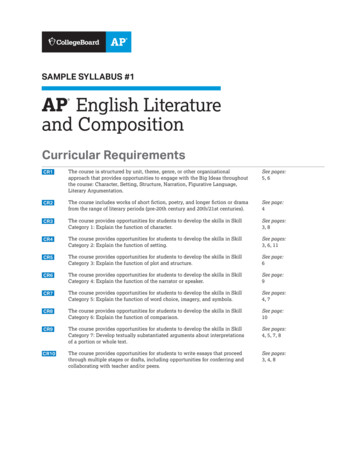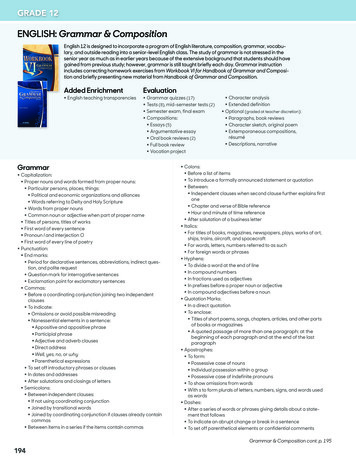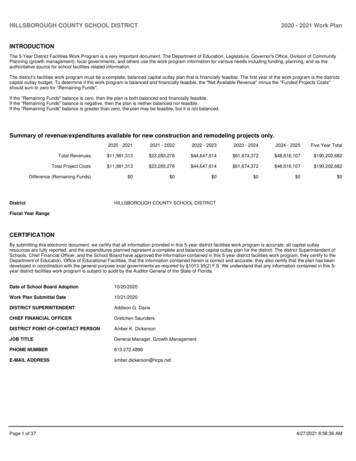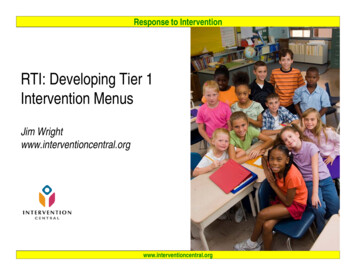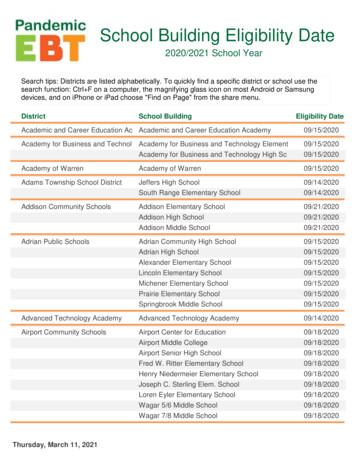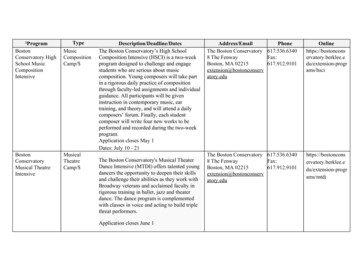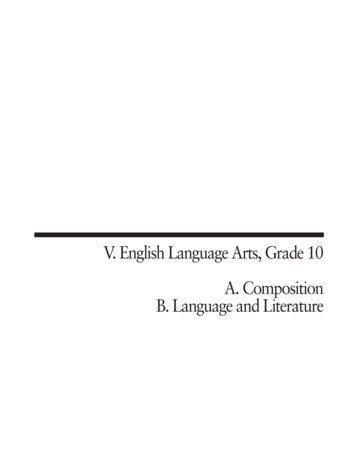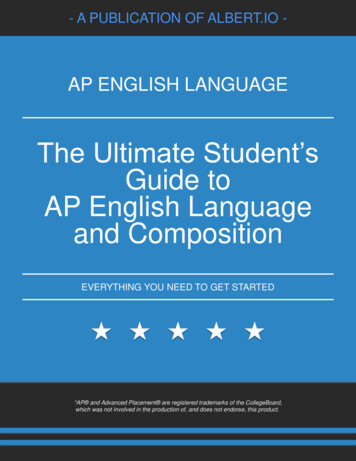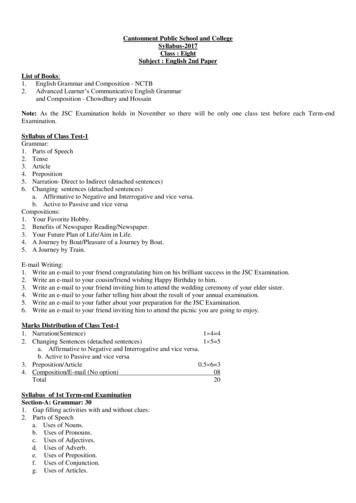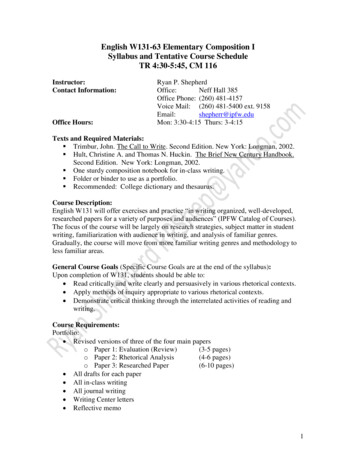
Transcription
English W131-63 Elementary Composition ISyllabus and Tentative Course ScheduleTR 4:30-5:45, CM 116Instructor:Contact Information:Office Hours:Ryan P. ShepherdOffice:Neff Hall 385Office Phone: (260) 481-4157Voice Mail: (260) 481-5400 ext. 9158Email:shepherr@ipfw.eduMon: 3:30-4:15 Thurs: 3-4:15Texts and Required Materials: Trimbur, John. The Call to Write. Second Edition. New York: Longman, 2002. Hult, Christine A. and Thomas N. Huckin. The Brief New Century Handbook.Second Edition. New York: Longman, 2002. One sturdy composition notebook for in-class writing. Folder or binder to use as a portfolio. Recommended: College dictionary and thesaurus.Course Description:English W131 will offer exercises and practice “in writing organized, well-developed,researched papers for a variety of purposes and audiences” (IPFW Catalog of Courses).The focus of the course will be largely on research strategies, subject matter in studentwriting, familiarization with audience in writing, and analysis of familiar genres.Gradually, the course will move from more familiar writing genres and methodology toless familiar areas.General Course Goals (Specific Course Goals are at the end of the syllabus):Upon completion of W131, students should be able to: Read critically and write clearly and persuasively in various rhetorical contexts. Apply methods of inquiry appropriate to various rhetorical contexts. Demonstrate critical thinking through the interrelated activities of reading andwriting.Course Requirements:Portfolio: Revised versions of three of the four main paperso Paper 1: Evaluation (Review)(3-5 pages)o Paper 2: Rhetorical Analysis(4-6 pages)o Paper 3: Researched Paper(6-10 pages) All drafts for each paper All in-class writing All journal writing Writing Center letters Reflective memo1
Paper 4: Memoir(3-5 pages) Paper 4 will not be included in the portfolio; instead, this paper will be turned inat the time of the student’s portfolio conference.Class Participation: Peer Review Class DiscussionJournal: Weekly journals of 1-2 pages per weekIn-Class Writing: Weekly in-class writings of 1-2 pages per weekEvaluation:Final grades for the course will be based on the following:Portfolio Paper 1: Evaluation (Review)15% Paper 2: Rhetorical Analysis15% Paper 3: Researched Paper20%o Final Paper15%o Annotated Bibliography3%o Research Proposal2% Improvement3% Writing Center letters2%Paper 4: MemoirClass Participation Peer Review5% Conferences3% Class Discussion2%JournalIn-Class Writing55%15%10%10%10%Note: No matter what your final grade is, you must submit all required work topass the course. This includes a completed portfolio, a final paper, journals, andin-class writing.Final Portfolio and Final Papers: Final papers will be graded based on criteria determined by the instructor withinput from the class. Final papers will not be graded without accompanyingdrafts. As part of the researched paper, students will be asked to complete an annotatedbibliography and research proposal; both will be discussed in class.2
Students will be required to visit the Writing Center (Kettler G19) twice duringthe semester, once before the second draft of their evaluation paper and at oneother time of the student’s choosing. Proof of these visitations (letters printed outupon request at the Writing Center) must be included in the portfolio.Improvement in writing ability will be considered when giving the portfolio afinal grade.A reflective memo, discussed in class, will be required as part of the portfolio.Please Note: incomplete portfolios will not be graded.Class Participation:Class participation requires that students attend class and actively discuss the materialsfor that class meeting. Student comments and feedback are required when discussingreadings and examples. Students are required to participate in all peer review sessionswith active, concrete, and helpful criticism of other students’ papers. Students are alsorequired to attend four individual conferences with the instructor over the course of thesemester: one after the first draft of each of the first three papers and a final conference todiscuss the portfolio. Failure to attend these conferences will affect both the participationgrade and the grade of the individual papers.Journal:Students will be required to write one to two pages per week in their journals. Journalswill be graded solely on completeness and not on content. Journals will be collectedperiodically for review by the instructor.In-Class Writing:Every Tuesday, an assignment will be given for students to complete in class. Theseassignments will be graded for completeness, meeting the criteria determined by theinstructor, and general coherence of thought.Attendance:While attendance is not graded directly, failure to attend class will cause students to missin-class writings, peer reviews, class discussions, and many graded and otherwiseimportant aspects of the class. Attendance is strongly encouraged. Students who misspeer reviews, conferences, or in-class writings may not make them up unless theirabsence is discussed with the instructor before class time.Tardiness:Being late to class is disruptive and frowned upon. Tardiness may also cause the studentto miss important information regarding the class, in-class writings, and class discussions.Late Papers and Portfolios:Late papers will only be reviewed if discussed with the professor before the due date.Late portfolios will not be accepted.3
Format of Papers:All papers should be in Times New Roman 12 point font or equivalent (please no fancyfonts), should be double spaced, and should have one inch margins all around. Title andauthor’s name should be on the top of the first page. All pages must be numbered. Notitle pages are necessary and are, in fact, discouraged. PLEASE STAPLE ALL PAPERSBEFORE CLASS.Plagiarism:Deliberate plagiarism (including purchased papers) present in portfolio writing will resultin a failure of the course. Unintentional plagiarism will result in an incomplete, and thestudent will be allowed to resubmit the portfolio when the errors have been remedied. Ifthe student fails to correct the unintentionally plagiarized portion of the portfolio, thepaper will receive no credit.Resourses: The Writing Center, located in Kettler G19, is a free service to IPFW students.Consultants offer one-on-one help with any portion of the writing process, fromcoming up with ideas to looking over a final draft. The Writing Center, however,does not edit your work. Hours are Sunday 1-5, Monday 10-5, Tuesday-Thursday10-7, and Friday 10-1. The Writing Center is closed Saturdays. Drop-ins arewelcome, but appointments receive priority. Students may sign up forappointments outside KT G19 or by calling (260) 481-5740. For moreinformation and online consulting, visit the Writing Center website:www.ipfw.edu/engl/wchome.htm Center for Academic Support and Advancement (CASA), located in Kettler G21,is a free tutoring service for IPFW students. Each student is entitled to two freehours of tutoring through CASA for every course taken. For more informationcall (260) 481-6817. Helmke Library offers assistance to students for research and academic projects.For more information or library hours call (260) 481-6512 Open-access Computing Labs are located in Kettler 204A, 217, and 217A; NeffB71 and B73; Engineering Technology 305; Helmke Libaray first floor andlounge (24-hour lab); Science Building G15; and Walb 221. Hours vary from labto lab. Call (260) 481-6068 for more information. Services for Students with Disabilities: If you have a disability or acquire one andwant to find out what special services and accommodations are available, youmay contact Services for Students with Disabilities in Walb 113 or by calling(260) 481-6657.4
English W131 Specific Course Goals:1. Read critically and write clearly and persuasively in various rhetorical contexts. Toachieve this goal, students will: Read and write a variety of texts for distinct purposes and for a variety of personal,public, and academic audiences. Written work should include several out-of-class textsand some in-class writing. Most out-of-class texts should be four-to-five double-spaced,word processed pages and should include some type of research. At least one longer (sixto-seven page) academic, researched project should be assigned. Practice the recursive stages of the writing process (e.g., inventing, drafting, organizing,revising, editing) for each project, and become aware of the differences in the processesrequired for different texts. Develop and support a significant and insightful main point, or thesis, in all papers. Compose texts that are focused and well-developed through the use of details, examples,comparisons, statistics, citation of authorities, and so forth. Practice summarizing and paraphrasing material from a variety of texts as a means ofdeveloping and supporting their ideas. These texts should include both mid-level(substantial) periodicals and scholarly journals. Practice different ways of organizing and arranging ideas and content that are appropriatefor various rhetorical contexts; experiment with different document designs bymanipulating spacing, fonts, graphics, colors, etc. Demonstrate knowledge of usage, spelling, punctuation, diction, and sentence structureconventions. Practice revision strategies that will lead to greater stylistic maturity.2. Apply methods of inquiry appropriate to various rhetorical contexts. To achieve thisgoal, students will: Generate information using a variety of heuristics (e.g., freewriting, brainstorming,clustering, cubing, etc.) Learn to use for specific purposes computer databases and indexes, printed indexes,document delivery services, and the Internet. Use primary research methods such as observing and interviewing and incorporate theresults in their papers. Synthesize materials drawn from various primary and secondary sources with their ownideas and experiences. Move beyond mere reporting of information to make an original contribution toknowledge. Document researched writing using formats appropriate for their audiences and forums(most often APA or MLA).3. Demonstrate critical thinking through the interrelated activities of reading and writing.To achieve this goal, students will: Annotate, analyze, evaluate, and discuss a variety of student and professional texts,focusing primarily on rhetorical principles under study. Analyze problems or issues from a variety of perspectives, moving beyond either/orreasoning. Analyze and discuss in writing their own work through reflective memos and/or journals.5
Tentative Course ScheduleDateIn-Class Discussion and ActivityT 8/26Introduction to the CourseReview of SyllabusIn-Class Writing #1Introduction to Evaluation (Review) PaperIntroduction to JournalingIntroduction to the Writing CenterR 8/28T 9/2R 9/4T 9/9R 9/11T 9/16R 9/18T 9/23R 9/25T 9/30R 10/2T 10/7R 10/9Discuss Sample ReviewsPrewriting WorkshopIn-Class Writing #2Grading Criteria for Review PaperDiscuss Common Grammar ProblemsIntroduction to Peer ReviewAssignment of Peer Review GroupsIn-Class Writing #3Peer Review of Evaluation PaperDiscuss Peer ReviewIntroduction to Rhetorical AnalysisSearch WorkshopIn-Class Writing #4Discuss the Use of an Outline with TextsDiscuss WC SheetDiscuss ReadingIntroduction to Instructor CommentsIntroduction to ConferencingIn-Class Writing #5Evaluation ConferencesDiscuss RewritingGrading Criteria for Rhetorical AnalysisIn-Class Writing #6Peer Review of Rhetorical AnalysisIntroduction to Researched PaperDiscuss Research ProposalIn-Class Writing #7Introduction to Helmke LibraryFor ClassHANDOUTS: SampleReviews and JournalingTopicsREAD: The Call to Write(CW) pg. 386-390, 395396, and 407-412READ: Sample Reviewsand The Brief New CenturyHandbook (NCH) pg. 10-17READ: NCH 381-398 and479-480READ: NCH 42 and 44-48DUE: First draft ofEvaluation Paper; pleasebring enough copies for allgroup members.DUE: Journal to date.HANDOUT: WCRhetorical Analysis Sheet.READ: CW 32-47, 55-62DUE: Second draft ofEvaluation Paper forinstructor commentary.READ: Handout and CW65-71DUE: Article for RhetoricalAnalysis for instructorreview.READ: NCH 32-42DUE: First draft ofRhetorical Analysis.READ: CW 353-355 and536-539 and NCH 95-99DUE: Second Draft of6
Class meets in Helmke Library room 440aT 10/14R 10/16T 10/21NO CLASS: Fall RecessRhetorical Analysis ConferencesLibrary Research DayIn-Class Writing #8R 10/23Introduction to Annotated BibliographyDiscuss Sample Annotated BibliographiesMidterm ReviewDiscuss Documentation FormatsDocumentation Format WorkshopIn-Class Writing #9T 10/28R 10/30Discuss Sample Researched PapersT 11/4Discuss ReadingDiscuss WC ArgumentIn-Class Writing #10Discuss Plagiarism, Organization, and StyleDiscuss PIE HandoutR 11/6T 11/11R 11/13Grading Criteria for Researched PaperPaper Formats PresentationIn-Class Writing #11Peer Review of Researched PaperT 11/18Introduction to MemoirIn-Class Writing #12R 11/20Discuss Sample MemoirsT 11/25Portfolio discussion and questionsIntroduction to Reflective MemoIn-Class Writing #13R 11/27T 12/2R 12/4NO CLASS: Thanksgiving RecessResearched Paper ConferencesPortfolio Peer Review/ConferencingIn-Class Writing #14Rhetorical Analysis forinstructor commentary.DUE: Research ProposalDUE: Journal to date.HANDOUT: SampleAnnotated BibliographiesREAD: Sample AnnotatedBibliographiesHANDOUT: SampleResearched PapersSKIM: NCH 163-216 OR217-244DUE: AnnotatedBibliographyHANDOUT: WritingCenter Argument HandoutREAD: Sample ResearchedPapersHANDOUT: PIE HandoutREAD: Handout and NCH65-71READ: Handout and NCH49-65, 120-121, 144-146,and 150-151DUE: First draft ofResearched Paper.HANDOUT: SampleMemoirsREAD: CW 145-163 and167-173DUE: Second draft ofResearched Paper forinstructor commentaryDUE: Journal to date.HANDOUT: PortfolioGuidelinesREAD: CW 698-7007
T 12/9NO CLASS: Portfolio Work DayR 12/11Memoir Peer ReviewT 12/16R 12/18Exit ConferencesDUE: FINALPORTFOLIOS in myoffice by 7pmDUE: First Draft ofMemoirDUE: Memoir Final Draft8
Email: shepherr@ipfw.edu Office Hours: Mon: 3:30-4:15 Thurs: 3-4:15 Texts and Required Materials: Trimbur, John. The Call to Write. Second Edition. . (IPFW Catalog of Courses). The focus of the course will be largely on research strategies, subject matter in student writing, familiarization with audience in writing, and analysis of familiar .

